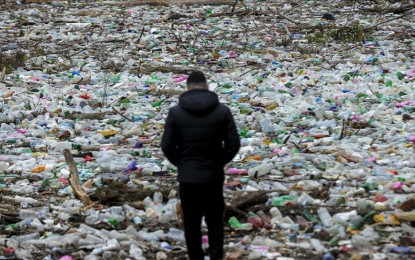
ISTANBUL – Experts have warned that the level of pollution in the Mediterranean has reached alarming proportions, with an average of 229,465 tons of plastic waste added annually.
They cautioned that if the current trend of increased production and consumption of plastics continues, pollution in the next decade could triple.
Speaking to Anadolu, Ahmet Kideys, a lecturer at the Middle East Technical University (METU) Institute of Marine Sciences, said the Mediterranean is one of the most polluted seas worldwide.
Describing plastic pollution as the world's biggest problem after global warming, Kideys said around 99 percent of the plastic pollution in the Mediterranean end up on the seabed “and the remaining on the sea surface or beaches.”
Egypt contributes 74,031 tons of plastic annually, of which 55,000 tons come from the Nile River; Italy disposes of 34,309 tons; Türkiye, 23,966 tons; Algeria, 13,111 tons; and Albania, 8,625 tons, he said.
“The accumulated amount of plastic on beaches is calculated as 374 kilograms per kilometer in Türkiye, 355 kilograms per square kilometer in Israel, 167 kilograms in Egypt, and 154 kilograms in Spain,” he said.
Black Sea garbage to the Mediterranean through surface currents
The marine ecologist highlighted the interconnectedness of seas, emphasizing that the Black Sea, Sea of Marmara, and the Aegean Sea are part of the Mediterranean.
He said surface currents from the Black Sea carry debris to the Mediterranean via the Marmara and Aegean Seas.
Highlighting the threat of microplastics, which are less than 10 microns in size and can easily be ingested by marine life, Kideys explained that this allows plastics to enter the food chain, eventually reaching humans.
He stressed that the plastic issue cannot be solved by individual countries alone, as plastics have no boundaries in the sea.
"Global discussions on a plastic prevention agreement are ongoing, and we expect it to come into effect in 2025,” he said.
“Just as we struggle to make significant progress in global warming and prevent temperatures from rising above 1.5 degrees, a similar situation exists with plastics,” he said. “If we can stop the inflow from rivers and implement serious measures regarding single-use plastics, we can observe a reduction in this pollution – not complete elimination, but a decrease.”
Plastic waste hits Türkiye's coastlines
Sedat Gundogdu, a lecturer from the Faculty of Fisheries at Türkiye's Cukurova University, identified the main causes of pollution entering the Mediterranean -- the widespread use of single-use plastics in the tourism sector, waste generated by coastal tourism activities, and countries with coastlines on the Mediterranean lacking proper waste management infrastructure.
He explained that the clockwise current movement causes each country's coastline to be polluted by its neighboring country.
"Unfortunately, today, the most polluted point of the Mediterranean from the north is our coasts,” he said.
"The current regime, insufficient activities along riverbanks, and the inadequacy of urban treatment infrastructures are increasing the waste burden. Unfortunately, the waste management infrastructure of countries up to Türkiye, including Israel starting from Morocco, is not as advanced. Syria and Egypt dispose of their garbage into the sea with trucks. Israel uses Palestine as its landfill, and there is also waste from the current war and destruction in the region."
Drawing attention to the coastal areas of Türkiye, Gundogdu pointed out that 30 to 40 kilograms of plastic waste per kilometer is hitting these areas daily.
In terms of the volume of plastic pollution on the Mediterranean coasts, he said: "In the Iskenderun Gulf, there is an average of 1.5 million pieces of plastic per square kilometer.”
The situation in Mersin Gulf is worse, reaching up to 10 million, he said, but noted that Antalya is somewhat luckier in this regard, with numbers half as much as Iskenderun Gulf.
“In the region where the Finike Submarine Mountains are located in the open sea, there are 739,000 plastics per square kilometer," he said.
80 percent of sea plastics come from single-use products
Discussing the types of pollutants found in wastewater, Gundogdu identified these as household and agricultural pollutants, detergents, industrial chemicals, paints, persistent and volatile organic pollutants, organic compounds, oils, heavy metals, and microplastics.
He pointed out that if wastewater treatment systems are not specifically designed to remove these pollutants, significant amounts of pollutants reach the seas.
"We are facing pollution that will turn our seas into a plastic soup. If the increase in the production and consumption of plastics continues, pollution will triple in the next 10 years, resulting in 90 kilograms of plastic per kilometer of coastline daily,” he said.
Gundogdu said “we can say that there will be approximately 3 to 15 million microplastics per square kilometer in the sea in the Mediterranean and Aegean.”
He said “80 percent of sea plastics come from single-use products.”
“We cannot solve this problem by collecting plastics from the seas and coasts without reducing production. None of these technologies are reducing plastic pollution. Trash collectors that clean the sea surface end up capturing more marine life. We need to reduce our plastic production by at least 40 percent in the next 20 years,” he added. (Anadolu)
